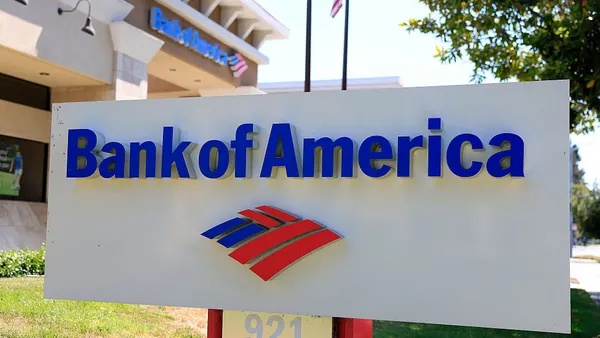Dive Brief:
- After a months-long interagency effort, dubbed a "crypto sprint," bank regulators said Tuesday they plan to issue guidance throughout 2022 regarding how banks can legally engage with digital assets.
- In a two-page joint statement, the Office of the Comptroller of the Currency (OCC), Federal Deposit Insurance Corp. (FDIC) and Federal Reserve said agency staff reviewed and analyzed a number of crypto-asset activities, including custody, facilitation of customer purchases and sales, loans, activities involving payments, and activities that may result in the holding of crypto-assets on a banking organization’s balance sheet.
- "The interagency sprints quickly advanced and built on agencies' combined knowledge, which helped identify and assess key issues related to potential crypto-asset activities conducted by banking organizations," the agencies said in a statement. Based on the preliminary work, the agencies said they have identified a number of areas where additional public clarity is warranted.
Dive Insight:
The brevity of the agencies’ long-awaited statement may surprise some.
The two-page report doesn’t provide many details or hard guidance regarding how financial institutions should navigate digital assets, but regulators said the industry should expect to see the agencies roll out further guidance throughout the next year.
"Throughout 2022, the agencies plan to provide greater clarity on whether certain activities related to crypto-assets conducted by banking organizations are legally permissible, and expectations for safety and soundness, consumer protection, and compliance with existing laws and regulations," the OCC, FDIC and Fed said.
The agencies said they believe the rapid growth of cryptocurrency presents "potential opportunities and risks for banking organizations, their customers, and the overall financial system."
"As supervised institutions seek to engage in crypto-asset-related activities, it is important that the agencies provide coordinated and timely clarity where appropriate to promote safety and soundness, consumer protection, and compliance with applicable laws and regulations, including anti-money laundering and illicit finance statutes and rules," they said.
Meanwhile, the OCC released a separate statement Tuesday confirming that national banks and federal savings associations can engage in certain cryptocurrency, distributed ledger and stablecoin activities, so long as they demonstrate they have adequate controls in place.
The release of Tuesday’s statement by the OCC follows the completion of a review of several interpretive letters that were issued under former Acting Comptroller Brian Brooks in 2020 and 2021. The letters were generally seen as favorable to the crypto industry, and interpreted by some banks as a green light to engage in digital asset activities.
However, shortly after taking over as Acting Comptroller in May, Michael Hsu, who has displayed a more cautious approach toward crypto than his predecessor, said in June he would revisit Brooks' actions regarding crypto.
"Today’s letter clarifies that the activities addressed in the previous interpretive letters may be conducted after a bank notifies its supervisory office of its intent to engage in the activities, and after a bank receives written notification of the supervisory office’s non-objection. The bank should not engage in the activity until it receives a non-objection from its supervisory office," the OCC said Tuesday.
Hsu said Tuesday’s OCC letter "reaffirms the primacy of safety and soundness."
"Providing this clarity will help ensure that these cryptocurrency, distributed ledger, and stablecoin activities will be conducted by national banks and federal savings associations in a safe and sound manner," he said in a statement. "Because many of these technologies and products present novel risks, banks must be able to demonstrate that they have appropriate risk management systems and controls in place to conduct them safely. This will provide assurance that crypto-asset activities taking place inside of the federal regulatory perimeter are being conducted responsibly."











